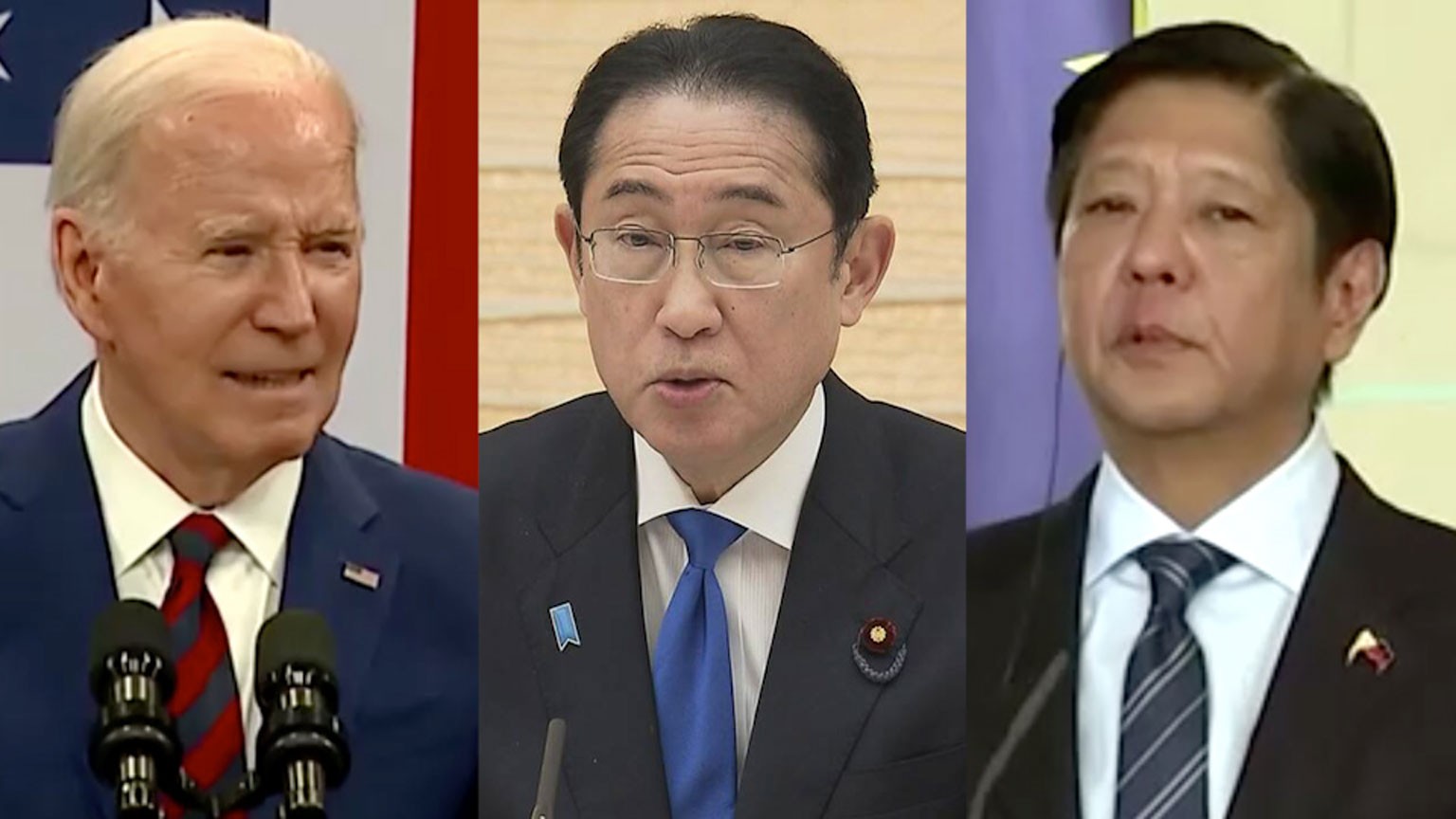Japan, US, Philippines summit to be held for the first time
U.S. President Joe Biden, Japanese Prime Minister Kishida Fumio and Philippine President Ferdinand Marcos Jr. will hold a trilateral summit in Washington on April 11. It is the first such meeting between leaders of the three countries.
The White House says the meeting will reaffirm the "ironclad alliances" that the US has with the Philippines and Japan. The leaders will also discuss trilateral cooperation to further peace and security in the Indo-Pacific and around the world.
Biden's invitation comes amid increasing Chinese assertiveness in the Indo-Pacific, particularly the East and South China Seas. This is believed to be behind his administration's aim to strengthen trilateral security cooperation and increase regional deterrence.
The three countries last year established a framework of senior security officials and have been discussing defense cooperation, such as joint exercises.
At the talks next month, the leaders are expected to share the progress of the discussions and confirm further security cooperation.
Enhancing deterrence
In February last year, Washington and Manila agreed that US forces would be allowed to use four more bases in the Philippines, a move apparently aimed at enhancing deterrence against escalating Chinese military activities in the region.

Three are in the northern part of Luzon Island near Taiwan and one is in the western part of the Philippines. This faces the South China Sea, where China has in recent years ramped up its maritime activities such as reef reclamation and obstruction of Philippine ships.
China reacted sharply to the agreement and criticized the US.
Foreign Ministry spokesperson Mao Ning said that defense and security cooperation between countries should not hurt or target the interests of a third party.
She added that the United States has continued military buildup in the region for its own benefit, thereby raising regional tensions and harming peace and stability.

Philippine President Marcos tried to fend off this criticism, saying that an agreement with the US is not aimed at taking aggressive action against other countries.
But the US has continued to strengthen its cooperation with the Philippines since then. From March to April last year, it conducted its largest-ever joint military exercise with the Philippines and provided a new reconnaissance aircraft to the Philippine Air Force.

Japan, too, is strengthening its cooperation with the Philippines, also taking part in joint military exercises. In addition, it exported a Japanese-made air-surveillance radar system to the Philippines in December, installing it in the western part of Luzon facing the South China Sea. The Philippine government has indicated that this radar information will be shared with Japan and the United States.
Rising tensions between the Philippines, China in South China Sea
There is a long history of friction between Manila and Beijing over maritime disputes.
China has drawn the so-called nine-dash line in the South China Sea and claims jurisdiction over almost all of it. China has also built artificial islands in the area and built military bases to strengthen its claim.
On July 12, 2016, a tribunal of judges at the Hague-based Permanent Court of Arbitration ruled in favor of the Philippines and dismissed China's claims to the waters.
But China rejected the ruling and continued with dredging and landfill work in the area, prompting protests from the Philippines and other nations with claims.
Tensions escalated under the Marcos administration, which took office in June 2022 and has been vocal in criticizing Chinese actions in the region.
In February 2023, the Philippine Coast Guard said a Chinese Coast Guard ship had directed a military-grade laser at one of its vessels near a shoal of the Spratly Islands on February 6. The shoal is in the Philippines' exclusive economic zone.

The Chinese Coast Guard argued the Philippine side was at fault since its vessels ignored a warning and approached a Chinese ship.
China's Water Cannon
On August 5, 2023, the Philippines accused China's Coast Guard of blocking a supply boat and firing a water cannon at it. Two days later, China's Coast Guard urged the Philippines to remove the grounded warship from the area.
The Philippines, the United States and other countries criticized the move, but Chinese Coast Guard ships repeatedly sprayed water cannon on Philippine ships.
On March 5 this year, four crew members of a Philippine military supply vessel were injured due to water cannons.
The Philippines said this was the most serious incident in the recent series of clashes.

The commander of the US Indo-Pacific Command, John Aquilino, has expressed strong concern and said that if a Philippine soldier is killed, the mutual defense treaty could be applied. He said that if that happens, he would be asked to present an option to the defense secretary, hinting at a possibility that it could lead to a military response by the US and issuing a strong warning to China.

We asked NHK World's security commentator Hanazawa Yuichiro about the issue.
Q: Japan, the United States, and the Philippines will hold their first trilateral summit meeting. Why will it take place and what is its aim?
A: This is a symbolic event showing the strong determination of the three nations to stand up to China's high-handed moves in Taiwan and the East and South China Sea. It shows that they share a strong sense of caution against China, especially a potential Chinese invasion of Taiwan.
Through simulation of a Taiwan contingency, the US military thought that it was "fragile" that its forces are excessively concentrated in a small number of bases such as Okinawa and Guam, along with aircraft carriers.
It has been pointed out that if such bases came under attack by a large number of missiles at the same time, they would be unable to intercept them, resulting in major damage. That is because the Chinese military has improved its missile numbers and capabilities.
In response, the US has been aiming to disperse its forces and enhance its missile capabilities to prevent the Chinese military from landing on Taiwan. Enhancing deterrence in this way has become a major issue for the US.
So it is very important for the US military that the Philippines has agreed to let it use four new bases, especially since three of them are located in the northern part of Luzon Island, which is close to Taiwan.
Q2: Why is cooperation advancing so rapidly?
A2: The sense of crisis in the United States and shift of the Philippines government are largely related.
The previous administration of President Rodrigo Duterte had great economic expectations of China but responded coldly to the US, sometimes sharply condemning it. As a result, the relationship chilled. But President Ferdinand Marcos Jr., who took office in June 2022, has changed policy and strengthened cooperation with the US.
Furthermore, China's continued hardline moves in the South China Sea have worsened the sentiments of the Philippine people towards China, accelerating the trend.
Residents in areas close to the base have voiced opposition and concern. Economic relations with China are also important to the Philippines.
However, China's repeated actions in the South China Sea have resulted in the Philippines preparing to become more cooperative with the US.
Q3: The unity of the three countries will be emphasized this time, but what does it mean for Japan?
A3: Japan is also rapidly increasing its vigilance against China.
Japan's Yonaguni Island is only a little over 100 kilometers from Taiwan, and Japan is on high alert for any Taiwan emergency situation.
Japan is also constantly under pressure from China over the Senkaku Islands. Japan controls the islands and the Japanese government maintains the islands are an inherent part of Japan's territory. China and Taiwan claim them.
The Philippines is also close to Taiwan and continues to face pressure from China in the South China Sea. Japan hopes to boost deterrence against China by strengthening cooperation among countries in a similar situation, and by uniting with the US. In that sense, the Philippines is a very important partner for Japan.
Q4: Do you mean that the importance of the Philippines is increasing for Japan and the US?
A4: There are two key aspects. One is the importance of the Philippines as a military strategy. The other is that the Philippines went a step further and made clear its stance to China and its intention to strengthen relations with the US.
ASEAN countries have had high expectations and economic dependence on China, and their lukewarm response to China has stood out. Most countries have repeatedly expressed their neutral stance, and that they don't want to get involved in the conflict between the US and China.
Amid these circumstances, it became very important for the US and Japan that the Philippines makes a major shift to strengthening relations with them.
The summit meeting scheduled for April 11 in Washington DC will be a symbol of the three nations' determination to strengthen their unity, counter China and enhance deterrence.

